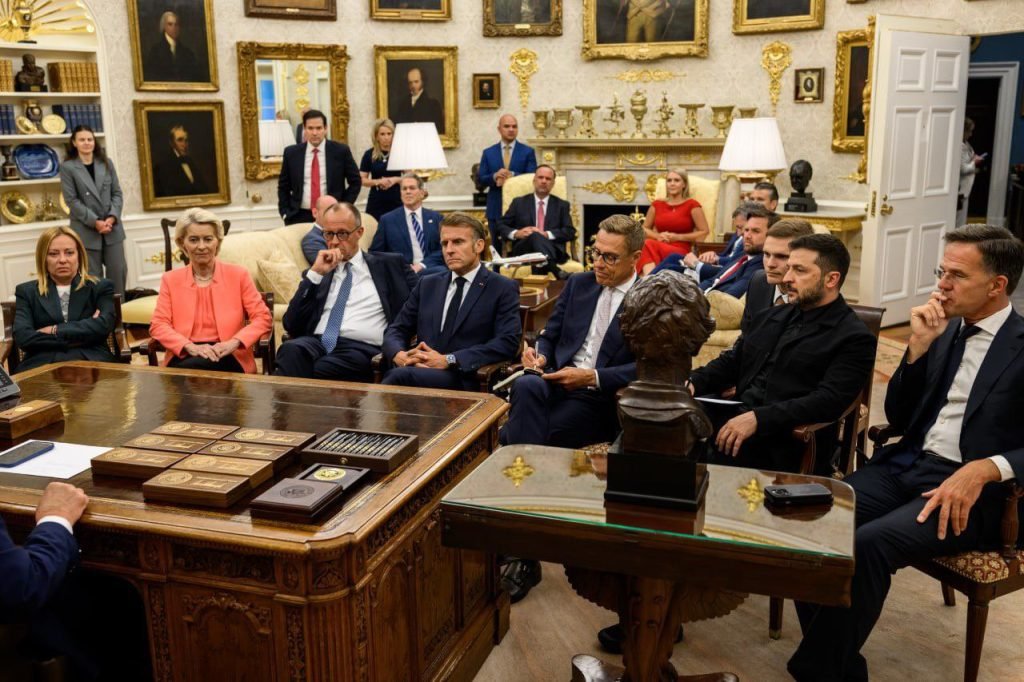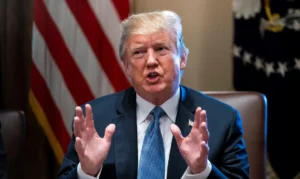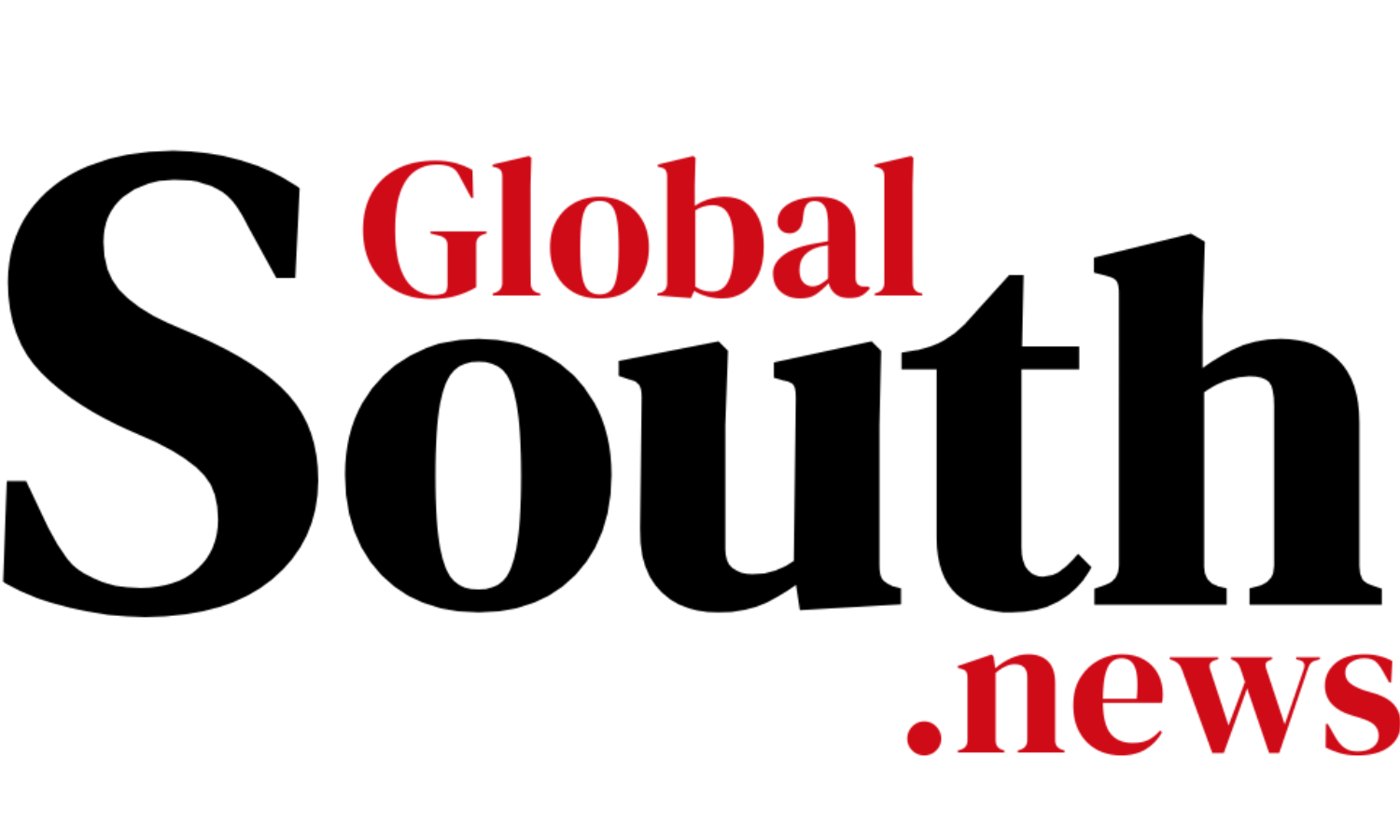
Terrified by the possibility of peace after the meeting between Vladimir Putin and Donald Trump in Alaska, European leaders hastily organized a pilgrimage to Washington. They did not rush to save Ukraine, but to beg the American emperor not to allow the end of the carnage. Seven of the most powerful world leaders abandoned their schedules to kneel before Trump, offering billions in tribute and limitless adulation. The objective was clear: to convince the American president to embrace proposals that Putin could never accept, thus ensuring the continuation of a war that Europe insists on prolonging.
The spectacle of subservience reached grotesque proportions, as documented by the Washington Post in a report published today. Volodymyr Zelensky, who was humiliatingly expelled from the White House by Trump in February, learned the lesson of flattery. In just four and a half minutes, the Ukrainian president thanked the American leader eleven times. “Thank you, Mr. President, for having us. Thank you,” Zelensky repeated in a performance that included thanks for receiving a map of his own country. The transformation was complete: from the military uniform that irritated Trump to the suit that pleases him, from the haughty posture of February to the genuflection of August.
The race of the European vassals was no less servile. Emmanuel Macron, Friedrich Merz, Keir Starmer, Giorgia Meloni, Ursula von der Leyen, and Mark Rutte formed a chorus of adulation, each competing to see who could court Trump most effectively. The NATO Secretary-General went so far as to call the American president “dear Donald,” while all took turns in thanks and praise. Seven leaders who command hundreds of millions of Europeans were reduced to courtiers anxious for imperial approval, in a display of vassalage that would have shamed even the diplomats of the Holy Roman Empire.
The Tributes of Despair
The tributes offered reveal European panic. Ukraine proposed to buy 100 billion dollars in American weapons, with European financing, in a frantic attempt to buy influence and prevent any peace agreement. European taxpayers’ money would be used to enrich the American military-industrial complex, while Trump decided the fate of the continent. Europe, which once prided itself on its strategic autonomy, was reduced to paying tribute to maintain relevance in decisions about its own future. The submission was complete: not only political, but also economic.
Behind this diplomatic submission is a calculated and perverse strategy. European leaders do not want peace; they want to prolong the war. Their tactic is to convince Trump to embrace a proposal that Putin could never accept: a ceasefire that would be just a pause for Ukrainian rearmament. This deception would allow Ukraine to militarily reorganize while maintaining the rhetoric of “peace negotiations.” In practice, it would be a diplomatic farce, a preparation for a new war, not a definitive solution. Europe knows that Putin cannot accept this farce, and that is exactly what it wants: to keep the conflict active indefinitely.
The contrast with Putin’s posture is revealing. The Russian leader also employed flattery during his meeting with Trump in Alaska, but from a completely different position. Putin flattered as a representative of a country that is winning the war, not as a humiliated supplicant. His praise for Trump was aimed at consolidating advantages, not at begging for survival. The result was immediate: Trump blamed Zelensky on social media, suggesting that Ukraine should promise never to join NATO and cede Crimea.
The Death of Real Diplomacy
This diplomatic farce contrasts brutally with the principles of true diplomacy, as defined by Michael von der Schulenburg in an interview with analyst Glenn Diesen. The veteran German diplomat, with 34 years of experience at the UN, states that real diplomacy is based on three pillars: demonstrating respect for the adversary, listening to their positions, and trying to understand their motivations. For this reason, he celebrated the meeting between Putin and Trump last Friday in Alaska as a way to resurrect a bit of classic diplomacy, which seems to have been killed and buried by today’s Western powers.
Von der Schulenburg, a member of one of the rare European left-wing parties that have not succumbed to Russophobia, observes that Europe has gone from arrogant to servile, but never learned to be diplomatic.
International experts have for years been warning about the true causes of this conflict, analyses that Europe prefers to ignore in its obsession with prolonging the war. John Mearsheimer, from the University of Chicago, documents how NATO’s eastward expansion violated implicit promises and ignored legitimate Russian security concerns. Emmanuel Todd, in “The Defeat of the West” (January 2024), explains that the demonization of Putin ignores the fact that he managed to stabilize the country, achieving important advances for Russian society, such as dramatically reducing infant mortality, improving education, and recovering infrastructure. Scott Horton, in “Provoked” (May 2024), documents the systematic American provocations since the end of the Cold War. Jonathan Haslam, in “Arrogance” (September 2024), analyzes how Western hubris created Russian isolation. All agree: the war has antecedents that must be discussed to build a real peace.
The reality that Europe refuses to accept is that Ukraine has already lost this war. The country no longer has enough soldiers to fight, the United States no longer has enough weapons to provide in the necessary quantity, and Europe no longer has enough money to sustain the war effort indefinitely. Ukrainian territory continues to be lost, the population is fleeing en masse, and the economy is destroyed. Even so, European leaders prefer the fantasy of victory to the acceptance of defeat, unnecessarily prolonging the suffering of millions of people. The European obsession with avoiding peace has become more important than saving lives.
The only viable solution is a definitive agreement that discusses the causes of the war, not just its symptoms. Russian security concerns are legitimate and must be heard, not ignored. A real agreement requires recognizing that NATO’s expansion was a strategic error, that promises made to Russia were broken, and that Ukrainian neutrality is essential for European stability. This means accepting the Russian terms and seeking a definitive diplomatic solution, not a deceptive truce that would only prepare for a new war. Europe needs to choose between the realism of peace and the fantasy of an impossible military victory.
The “thank you, sir” diplomacy represents the epitaph of European dignity. A continent that once dictated the course of the world has been reduced to begging for relevance in decisions about its own destiny. The desperate race to Washington revealed not only the loss of European sovereignty but the transformation of leaders into courtiers, allies into vassals, and diplomats into professional sycophants. As von der Schulenburg observes, Europe has lost not only a war but its diplomatic soul. The price of denying reality is always higher than the cost of accepting the truth, and Europe is paying that price with compound interest of growing humiliation and irrelevance.








